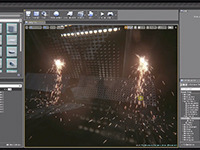
Time to take a little side trip away from the normal hustle and bustle of gaming and go down the avenue of how some of our favorite games, or soon to be favorite games, are made. I think any of us would be hard pressed to not be able to name a title made via the Unreal Engine. If you have to think too hard on that then you must turn in your 'Gamer Card' now. Still have it? Ok. Moving on now.
So in the recent year we have seen quite a bit of the amazing environments and visuals that the upcoming Unreal Engine 4 can pump out. If you feel like you are still in the dark on this then take a moment and check out the Infiltrator Demo from earlier this year below. I won't wait this time but do come back up and finish reading if you are one of the few who have not actually seen this amazing Real Time demo showing off the power of the engine.
If you are still here or just back we have yet another look at the back end of UE4 and how some of those cool effects were created. If you liked the environment dust, water effects, or the particle effects then you may be interested to see how all of these where created with minimal meshes and very specific textures. Including how Unreal Engine 4 can use texture masking to alter the collision detection and environmental reactions to a solid mesh. Think along the lines of taking a solid wall and placing a portable hole from Looney Toons fame to allow for the solid object to break "the laws of physics" in the game world. It's not really that complicated but you have to admit that does paint a nice picture in one's head.
I won't go into much more and let the video give you more detail as I don't want to be a full instructor here. Isn't it fun to see how our games are made? Now if only they released the SDK to the public to tool around with. One can dream.
Visual Effect - Part 2
For those who felt like hopping down, here is the original demo and the first part of the visual effects showcasing. Both are amazing and informative. Enjoy.
Infiltrator Demo
Visual Effect - Part 1
























![Clive Barker’s Hellraiser: Revival — Love Story [Uncensored] Clive Barker’s Hellraiser: Revival — Love Story [Uncensored]](https://img.youtube.com/vi/0ldDCZM1UV4/default.jpg)




















